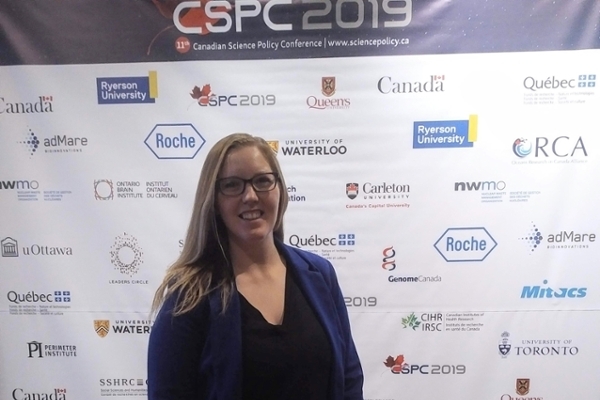
CSIP student attends CSPC in Ottawa
Michaela Neetz attended the 11th annual Canadian Science Policy Conference (CSPC) in Ottawa, November 13-15th, 2019.
By MIchaela Neetz, CSIP scholar and MPP studentThe Canadian Science Policy Conference (CSPC) was held this year in Ottawa, from November 13-15th, and I had the privilege of attending it. I, Michaela Neetz, am an MPP student at the Johnson Shoyama Graduate School (JSGS) and a Centre for the Study of Science and Innovation Policy (CSIP) Scholar.
My current research is focused on public attention to low dose radiation, working with agenda-setting theories and concepts. Prior to moving to Saskatchewan, I gained a BSc. majoring in geophysics from the University of British Columbia, and I worked across the Canadian territories and Alaska in mineral exploration. This was the first CSPC I have attended, and I looked forward to the networking opportunities. I hoped to gain insight into how scientists interact with the government and to see examples of the relationships built between government, industry, and academic research.
Beyond networking opportunities, the CSPC highlights the most current happenings and challenges faced at the intersections of science and policy. The conference offered panel sessions on topics ranging from artificial intelligence, to Indigenous knowledge, to using media to reduce mental illness stigma.
During the lunch session on Thursday, Mehrdad Hariri, CEO and President of the Canadian Policy Science Center had a conversation with Canada’s Chief Science Advisor, Dr. Mona Nemer. They discussed the current state of science policy and visions for the future. This included the adoption of science integrity policies by all government departments and the progress toward open science for Canada. Furthermore, in her address, Dr. Nemer presented a vision of a singular purpose-driven science; where all research efforts were working together to support the common goal of advancing knowledge and applying it for a better world. This vision was seemingly supported by others at this conference, as a similar message was presented again at a session speaking on research excellence. But, how do we achieve this vision? Below are my top three takeaways from the conference with various ideas from the panel sessions of ways we can improve and strive toward this vision.
- Be better communicators. Science has at times taken for granted its status, by assuming the evidence speaks for itself, but this is simply not true. Science must be communicated in a way that can be understood by everyone. And more importantly, facts should be presented in a context-specific way that considers the various ways of knowing. When misinformation is circulating it should be dispelled and science communicators should be supported by their fellow scientists. Additionally, policymakers should strive to understand and be critical of the evidence to ensure it is informing policy in the most meaningful way.
- Support collaboration. As society continues to confront wicked problems it will take all hands on deck to find the most impactful policies and solutions. Barriers need to be broken down and research—which is interdisciplinary, involves international collaboration, and works with the public as a stakeholder—should be supported. The merit of research should be measured using new criteria that encourage collaboration and breadth of research.
- Rethink what inclusivity means. Many have adopted policies that encourage equity, diversity, inclusion, and accessibility, but are these being implemented in a meaningful way? Are existing power dynamics being challenged? I think a good place to start is thinking about what Chris Googoo the Chief Operating Officer of Ulnooweg and the Director of Digital Mi’kmaq said, “Inclusion is accepting a different ideology”.
If you are interested in the science-policy interface and learning more about new approaches check out these links:
https://evidencefordemocracy.ca/en

